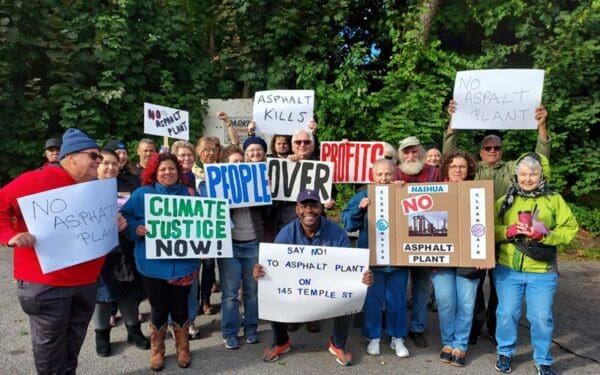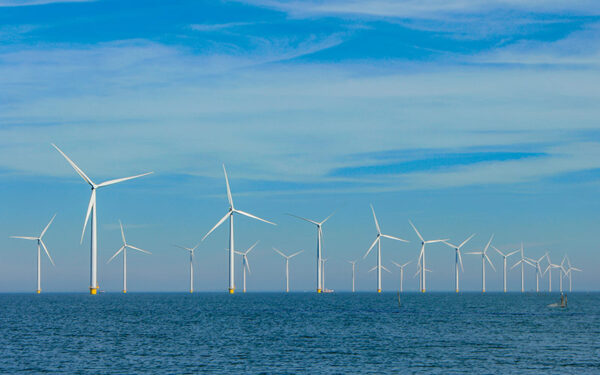
Greenwashing campaigns by polluting companies aim to distract us from fighting for real solutions to the climate crisis and other environmental threats. Photo: Shutterstock
Sometime last year, while simultaneously watching TV and scrolling through Instagram, a familiar voice caught my attention. It was a voice from my childhood and a personal hero of my mom’s – Bill Nye the Science Guy.
There he was – the lanky scientist with his iconic bow tie – made entirely of repurposed plastic bottles. I stopped scrolling to watch, expecting to hear some stats about plastic pollution and how evil corporations are destroying the climate in the name of profit.
“If we can recycle plastic and stop it from becoming trash, we can use that plastic again and again – it’s an amazing material!”
Wait – what? Did Bill Nye call plastic “an amazing material”? Is this a joke? I watched in utter disbelief as he continued:
“That’s why the good people at Coca-Cola are committing themselves to addressing our global plastic waste problem. They know they have a responsibility to help solve this issue. And their goal? To create a world without waste.”
Then I noticed it – the small font in the corner of the screen that said: “Paid partnership with thecocacolaco.” They had gotten to him. Bill Nye, THE Science Guy, was helping Coca-Cola, the largest plastic polluter in the world, with a greenwashing campaign.
Greenwashing Campaigns Aim to Distract and Mislead Us
Greenwashing is the act or practice of making a product, policy, or activity appear more environmentally friendly or less environmentally damaging than it really is.
That Bill Nye video is just one example of the manipulation and misinformation we are bombarded with each day by polluting corporations hoping to divert attention away from their misdeeds.
Environmentalist Jay Westerveld coined the term “greenwashing” in a 1986 essay inspired by the irony of the “save the towel” movement in hotels that had little impact beyond saving hotels money in laundry costs.
It’s a form of misdirection, a sleight of hand that diverts attention away from a company’s harmful practices and towards seemingly positive initiatives. For example, last year’s biggest sponsor of the most significant global climate summit (COP27) was Coca-Cola, the world’s largest plastic polluter.
How to Spot Greenwashing in Action
What does greenwashing look like?
- Nature-based imagery: Beautiful mountains, a fresh spring, or even something as innocuous as a leaf on plastic packaging or in an ad suggests the idea of sustainability – even if the product has nothing to do with the environment or, worse, actively harms it. Just look at literally any plastic bottled water.
- Recycling symbol: It seems obvious – the recycle symbol means it’s recyclable, right? Wrong. The plastic industry co-opted the recycling symbol to label plastic resins, beginning a decades-long misinformation campaign to convince the public that all plastic packaging is recyclable.
- Small print: At first glance, packaging may seem recyclable or even compostable. Whether it’s cardboard or plastic, surely it doesn’t go in the trash. Then you catch it – the fine print on the bottom that says “product is not recyclable” – so small you almost missed it. That’s exactly what Kim Kardashian was hoping for when her clothing company, Skims, decided to print “I am not plastic” on the supposedly compostable underwear packaging – followed by much smaller print stating the product is “low-density polyethylene,” also known as plastic type 4.
- Buzzwords: “Environmentally conscious,” “made from ocean-bound plastics,” “chemical recycling.” These phrases sound positive but are just vague enough to go unquestioned or unregulated – and without having to provide any proof that they’re true. Industry polluters, such as Big Oil, Gas, and Plastic companies, use this method to pass off their harmful products, packaging, or practices under an innocuous-sounding name to distract us from the truth. Just take “chemical recycling” – a miraculous-sounding process that really is too good to be true. Chemical recycling promises a solution to our plastic waste problem by finding a way to reuse hard-to-recycle plastics. Sounds great, but the truth is that “chemical recycling” is not recycling at all. Instead, it is a harmful process that releases toxic pollutants into our environment. Rather than actually recycling plastic waste into plastic products, the process turns plastic into fuel that will be burned, further polluting our air.
Greenwashing Isn’t Just Dishonest – It Harms People and the Planet
In the face of mounting environmental challenges, greenwashing stands as a stark reminder of the deceptive tactics employed by corporations. They use slick PR campaigns to create the illusion of progress while perpetuating practices that harm our planet. Whether it’s the beverage giants touting recycled plastic or energy conglomerates pushing “renewable natural gas,” actions often speak louder than words.
Greenwashing allows corporations to evade accountability for their contributions to climate change. These practices not only hinder genuine environmental progress but also erode public trust. They exploit genuine concerns about the environment and harness them for corporate gain.
To combat greenwashing, we must demand transparency. Holding corporations accountable for their actions is a crucial step toward protecting our environment for future generations. By rejecting distractions and demanding genuine sustainability efforts, we can work towards a more responsible and sustainable future for everyone. And that’s what we’re doing at CLF. We’re making sure that these greenwashing tactics fail to distract from true solutions to the plastic and climate crises.




